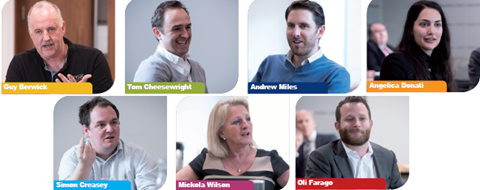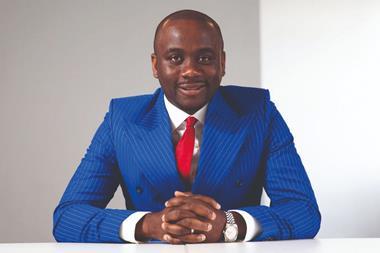Earlier this year Property Week in association with Freeths surveyed members of the property industry to find out what impact technology would have on their business over the next few years. The results were enlightening.

- Guy Berwick (GB), head of innovation & delivery, Freeths LLP Tom Cheesewright (TC), futurist speaker
- Angelica Donati (AD), co-founder, Houzen
- Oli Farago (OF), CEO, Coyote Group
- Andrew Miles (AM), co-founder, Realla
- Mickola Wilson (MW), director & joint owner/7 Dials Simon Creasey (SC), Property Week (chair)
Although businesses recognised the need for technology investment, there was a pervading sense that many property companies had not developed a ‘digital roadmap’ to aid the digital transformation of their business. At a recent roundtable discussion at the law firm’s London office, Property Week pulled together a panel of leading members of the proptech and property industry to discuss the importance of digital roadmaps and how businesses should go about creating one.
KPMG’s recently published global proptech survey found that 34% of respondents have a clear technological innovation business vision and strategy and a further 34% are working on developing one at the moment. Based on your first-hand industry experience how many property companies do you think have already created a digital roadmap?
TC: I think those figures are probably optimistic from the conversations I’ve had. The perception I get speaking to people across every facet of the property industry – if they’re being honest and if you strip away the sexy press releases about experiments with blockchain and everything else – is there is a huge amount of technical debt. There are lots of conversations about interesting disruptive technologies, but there are orders-of-magnitude improvements to be had in terms of efficiency and operational performance just from doing stuff that other people did maybe two decades ago.
AM: I think we would all agree the property industry is quite behind relative to other industries. The more interesting question to me is how fast is it coming up the curve. Three years ago the CEOs of global agencies and landlords didn’t necessarily want to talk about this stuff and if they did it was an afterthought, but now it’s very much at the centre of the agenda.
If we accept the fact that the industry is lagging behind other business areas how should property companies go about creating a digital roadmap for their business to get them back on the right track?
OF: Partly it’s about recognising the importance – and that has to come from the top down – of empowering people to innovate. You see these pockets of innovation in these big, older property businesses, but often when you drill into it they aren’t actually doing anything other than a lot of talking about how innovative they are and how they are going to change their business.
GB: I think we are at a point where you don’t need to fix what you haven’t got. The forward-thinking business has to look at how you build something that hasn’t existed before, which is much more agile. If you’re not yet at the party and you invest right you have the chance to jump ahead of rival businesses that have had a much higher IT profile over the years.
MW: If you look at the insurance industry 20 to 30 years ago the big revelation to them was they were in the data management business and not selling insurance. Then you had businesses like Reuters that thought they were in the journalism business, but they suddenly realised they were in the data distribution and information sharing business. So I think for the property industry the big business model change that is going to come is they will realise that one part of their business is matchmaking and the other part is just data management.
Do property businesses that want to undergo digital transformation need to engage with proptech companies?
AD: There are three things that you can do. You can build your own tech in-house if you have enough capabilities, you can work with outsourcing partners, such as proptech companies, or you can do nothing at all.
How easy is it to build and develop technology in-house?
OF: For many people it’s a risky business and I think people often underestimate the ongoing investment that is required. So they might say ‘here is an idea, let’s go and build it’ without realising they need to keep spending money on it every month, every quarter, every year if it is to stay leading edge. We sometimes liken it to tequila. Everybody has a story of that night they spent drinking tequila where they say ‘never again’ afterwards.
Well there are a lot of big companies out there that have stories about technology projects that went over budget, didn’t deliver and caused problems. So convincing these businesses that there is a new way and you don’t have to spend £500,000 on projects that last nine months – you can just give companies like us a go – isn’t easy.

AM: The industry is littered with failed in-house technology projects. To use a very simple analogy, if Google is building a new headquarters they hire architects and a construction manager to do it for them – they don’t send the software engineers out to drive the cranes. Real estate firms should do the same. They need to hire experts or partner with experts to provide the technology solutions that they need.
AD: We’ve seen a lot of companies that say ‘I want tech’ and they end up spending silly amounts of money building stuff that they don’t really need and that is actually not much better than the paper processes they previously used. You need to analyse your company from the inside out and from the outside in and really think about ‘what is it I need’. That’s what we always tell our clients. Figure out what you need before you invest in something that you end up having to use because you’ve spent months and hundreds of thousands of pounds developing it.
What would be your message to companies that don’t already have a digital roadmap in place?
OF: It’s never too late, but you’ve got to start now. You might be the current market leader, but if you’re not embracing real change you’re not necessarily going to stay that way.
MW: This [digital transformation] can give you multipliers of improved efficiencies and it can therefore make you money. If you can get that message across then companies will be interested from top to bottom.
TC: Find a disruptor. Get someone external who can look at your business with a fresh pair of eyes and tell you what you’re missing.
GB: Just be bold, be brave. Go and find somebody who will build something different to what everyone else, who you are trying to compete with, has.































No comments yet